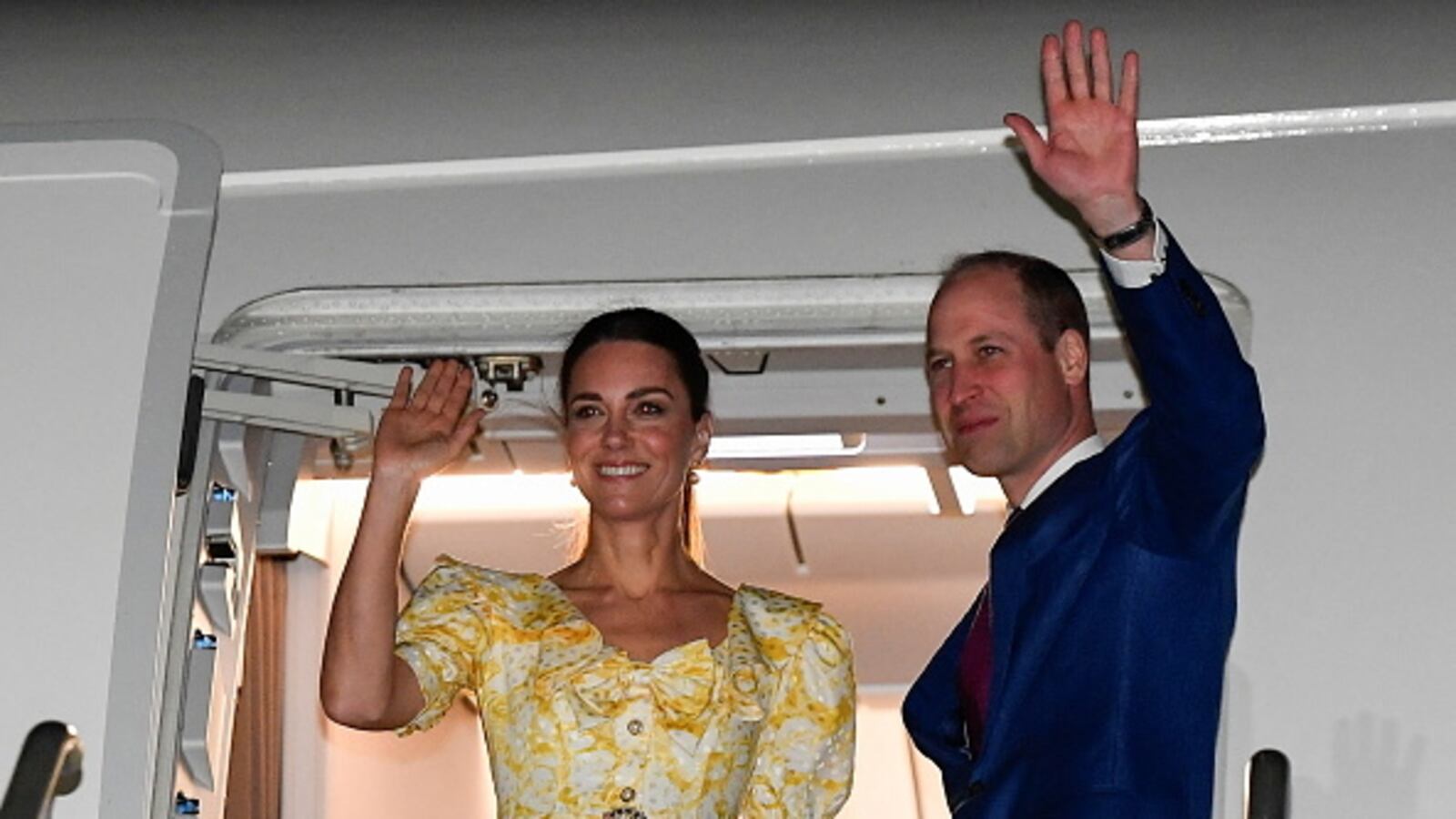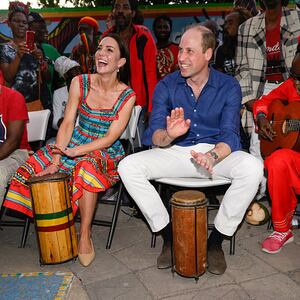If you love The Daily Beast’s royal coverage, then we hope you’ll enjoy The Royalist, a members-only series for Beast Inside. Become a member to get it in your inbox on Sunday.
William envisions royal-free Commonwealth future
Prince William and Kate Middleton know how their Caribbean tour has been received—as a colonial-era tribute tour rather than a nuanced, thought-out week of activities tackling slavery and the indignities, cruelties and shame of the past head-on. Now he has alluded to the future of the three countries they visited (and others like them), ultimately working without the royals as heads of state.
Clearly recognizing that he and Kate had ended-up looking like colonial overseers rather than a new age of forward-facing royals, William issued an extremely pointed statement as the tour wound up Saturday, implying that he doesn’t think the Commonwealth is best headed by himself, or any other member of the current royal family—even though his father, Prince Charles, will become precisely that after the queen’s death.
“Foreign tours are an opportunity to reflect. You learn so much. What is on the minds of Prime Ministers. The hopes and ambitions of school children. The day-to-day challenges faced by families and communities,” William’s statement read.
“I know that this tour has brought into even sharper focus questions about the past and the future. In Belize, Jamaica and The Bahamas, that future is for the people to decide upon. But we have thoroughly enjoyed spending time with communities in all three countries, understanding more about the issues that matter most to them. Catherine and I are committed to service. For us that's not telling people what to do. It is about serving and supporting them in whatever way they think best, by using the platform we are lucky to have.
“It is why tours such as this reaffirm our desire to serve the people of the Commonwealth and to listen to communities around the world. Who the Commonwealth chooses to lead its family in the future isn't what is on my mind. What matters to us is the potential the Commonwealth family has to create a better future for the people who form it, and our commitment to serve and support as best we can.”

Prince William, Duke of Cambridge and Catherine, Duchess of Cambridge visit a Fish Fry – a quintessentially Bahamian culinary gathering place which is found on every island in The Bahamas on March 26, 2022 in Great Abaco, Bahamas. Abaco was dramatically hit by Hurricane Dorian which saw winds of up to 185mph and left devastation in its wake. Their Royal Highnesses are learning about the impact of the hurricane and see how communities are still being rebuilt more than two years on.
Samir Hussein - Pool/WireImageBelize, Jamaica, and the Bahamas have long been independent countries, but have so far retained Queen Elizabeth as head of state. The ill-conceived tour was intended as a “thank you” to the three countries in the year of her Platinum Jubilee.
But it turned into one royal nightmare after another, topped with cringing images, like William and Kate waving regally from the same open-topped Land Rover the queen had done so from many years before, and greeting crowds with hands outstretched through a wire fence. A trip to a Belize cacao farm was canceled, with protesters holding “Prince William, leave our land” signs.
While William expressed his “profound sorrow” in a speech over the “appalling atrocity” of slavery, many Jamaicans wanted a more directly phrased apology, as well as a commitment to pay reparations.
There were not only protests in Jamaica, but its own prime minister, Andrew Holness, emphatically stated right in front of the royal couple the country’s desire to be fully independent, following in the footsteps of Barbados which became a republic last year.
With William and Kate back in the U.K., the questions will be around how and why the tour was conceived, and what the future of the royal tour should and will be. And, even more profoundly, as William alluded to in his statement, should the Commonwealth even be led by the royal family?
Royal sources speaking to the Sunday Times said the media had not focused on the more positive aspects of the tour, such as cheering crowds, and speeches and visits set around education and conservation.
One aide told the paper: “The alternative is that we don’t come out and do these visits, which would be the wrong thing to do. It’s important to demonstrate that if you want to serve, you’re willing to come out and listen to the debates respectfully.”

Prince William, Duke of Cambridge and Catherine, Duchess of Cambridge attend a reception hosted by the Governor General at Baha Mar Resort on March 25, 2022 in Nassau, Bahamas.
Pool/Samir Hussein/WireImageComment: inside the Caribbean fiasco
Will Prince William direct an inquest into the abysmal planning of the Caribbean royal tour? He and Kate must be painfully aware of the impression left that they looked like part of what looked like the last parade of an old imperialist order rather than the refreshing avatars of a new and transformational Windsor generation, writes Clive Irving.
While the final stop of their tour of the Bahamas was as variously serious (a visit to a children’s home; marking the impact of Hurricane Dorian) and cheery (a fish fry, vegetable chopping, drinking local concoctions), the Cambridges and the palace themselves must be aware of what a fraught few days had unfolded.
“Next year, I know you are all looking forward to celebrating 50 years of independence,” William said in an address in the Bahamas. “And with Jamaica celebrating 60 years of independence this year, and Belize celebrating 40 years of independence last year, I want to say this. We support with pride and respect your decisions about your future. Relationships evolve. Friendship endures.”

Catherine, Duchess of Cambridge and Prince William, Duke of Cambridge ride in a Land Rover as they attend the inaugural Commissioning Parade for service personnel from across the Caribbean with Prince William, Duke of Cambridge, at the Jamaica Defence Force on day six of the Platinum Jubilee Royal Tour of the Caribbean on March 24, 2022 in Kingston, Jamaica. The Duke and Duchess of Cambridge are visiting Belize, Jamaica, and The Bahamas on their week-long tour.
Pool/Samir Hussein/WireImageMany people, including me, looked on the Cambridges as the best last hope that the monarchy could survive into the second quarter of the twenty-first century. They were to be the counterpoint to King Charles III—approachable, engaged in the real world, aware of the danger that the whole Windsor cavalcade was looking more and more like an endangered species once the queen was gone.
The planners of the tour seem to have scripted a rerun of past imperial processions through the colonies, oblivious to the impact of the Black Lives Matter movement, and the Cambridges themselves looked captured by the same courtiers who wanted to impound Prince Harry and Meghan Markle before they raised red flags about the appalling lack of diversity in the royal household.
Historical illiteracy is endemic in the palace culture. British imperialism’s dehumanization of colonial labor began in 1660 when Charles II granted a charter to the Royal African company, a foundational slave trading operation. William should make that the starting point for a re-education program in the palace.
Charles may replace queen at State Opening of Parliament
Prince Charles or Dominic Raab, the deputy prime minister and lord chancellor, may stand in for the queen if she is too unwell to attend the State Opening of the British parliament on May 10—a deeply pomp-filled ceremonial event she has only missed twice before, when she was pregnant with princes Andrew and Edward.
A royal source told the Sunday Times: “The date is in Her Majesty’s diary, and she hopes to attend. The Queen remains fit and active, and it is amazing how much she still does. But her diary is being paced to reflect the realities of a woman of her age, and to ensure that she is able to continue to do as much as she can and would like to do. All events will now be scheduled so that if Her Majesty is unable to attend at short notice, another member of the royal family will still be present.”
As with Prince Philip’s memorial service this Tuesday, a decision on the monarch’s attendance will be made on the day according to how the queen is feeling. The Sunday Times says she is “determined” to attend that event, which will be 40 minutes long, and designed “with her comfort in mind.”
A royal source told the paper: “It has been designed to maximize the opportunity for Her Majesty to attend. A very long service would make that difficult, and it is in keeping with what the duke would have wanted, reflecting his modest, understated approach to life.”

Queen Elizabeth II talks to guests at an evening reception for members of the Diplomatic Corps at Buckingham Palace on December 11, 2019 in London, England.
Victoria Jones - WPA Pool/Getty ImagesWheelchair? Make that luxe golf buggy!
Prince Philip’s memorial service is set to take place Tuesday, and all eyes will be on the queen. Will she be there? Will a meticulously planned operation to fly her by helicopter from Windsor and get her into Westminster Abbey by a side door happen? If she is, as is alleged, using a wheelchair, will she be seen in it?
Now, the Sun says, she is actually getting around Windsor Castle on a very pimp-my-golf-buggy (estimated price $82,000), complete with “all-weather covers, fridge and infotainment screen.”
She got what has become known as the “Queen Mobile” two weeks ago, and has already taken her Corgis for a spin on it, the paper reports. A source told the Sun: “She’s battled stiffness in her legs recently so the cart is perfect.”
Mother love
Today, Mother’s Day in Britain, the queen shared an image of her with her mother and sister, Princess Margaret, via the royal family’s Instagram page, with the message: “Wishing all those celebrating today a very special Mothering Sunday.” Via the Clarence House Instagram page, Prince Charles and Camilla shared an image of them with their own mothers via their Instagram page, with the message: “On mothering Sunday, we celebrate all the Mothers in our lives and are thinking of those who cannot be with their Mothers today. #MothersDay.”
This week in royal history
The day after Prince Philip’s memorial service on Tuesday may be another moment of remembrance for the queen, marking twenty years since the death of her mother, Queen Elizabeth the Queen Mother. The queen mother died on March 30, 2002, at Royal Lodge, Windsor. She was 101 years old.
Unanswered questions
Will the queen attend Prince Philip’s memorial service, and what will we see of her? Will William and Kate’s Caribbean tour lead to radical change when it comes to the royals presiding, or not presiding, over the Commonwealth?






